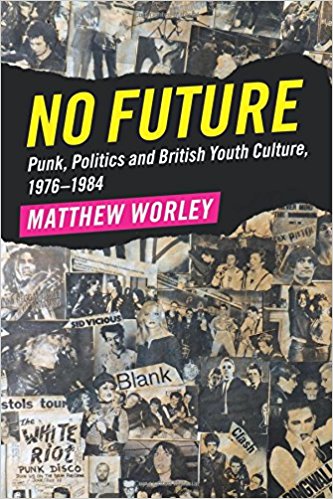
MATTHEW WORLEY – No Future: Punk, Politics and British Youth Culture, 1976-1984
- by J.N.
- Posted on 06-04-2018
Label:
Cambridge University Press
Rating:
5 / 6
This incredibly well-researched and thought-provoking book on British punk rock and its cultural impact is an exhaustive study of how the aforementioned genre came into being, what sparked it, how it tied in with British society and politics as a whole, and why it eventually disappeared somewhat on the radar of both popular and underground music. Author Matthew Worley has done an incredible job here and no stone is left unturned as he uncovers, discusses, and dissects each conceivable aspect related to the British punk. There is a staggering amount of information to be absorbed and digested within the pages of “No Future”, and this is one of those pieces of literature that one does not exactly read in one sitting. It is simply too heavy on details, names, venues, bands, managers, events, political currents in the UK, and so on for that. However, one should not be put off by that. What Worley essentially does is that he weaves all the different threads leading to and from UK punk music together in order to present an overview of what gave birth to this new musical epoch and how riveting and exciting the entire thing was. However, “No Future” revels in neither nostalgia nor sentimentality, which is one of its strong points, but at the same time, it is certainly not oblivious to the charm and magic of the music that was spawned back then. Worley’s enthusiasm and fascinating with how disillusioned youths with no future prospects came together and created something special that they could rightfully claim as their own is prevalent on nearly every page, which is great.
The book analyzes the DIY ethos often associated with punk rock, the fashion that went hand in hand with the music, the aesthetic quality and image of the movement, the fanzines that came into existence, the disorganized gigs and tours, how punk rock was portrayed in the media, and so on and so forth. This is a clear, concise, and utterly fascinating study of how British youth culture was re-energized, or re-vitalized, if one will, by the pioneering sounds of punk and all that went with it. Punk rock was a musical genre that was able to summarize how the kids felt about the insanely high unemployment, the socioeconomic changes, and the violence everywhere that were ravaging the country and tearing it apart. When reading Worley’s narrative, it feels like time travel in the sense that he manages to get underneath the skin of the punk era and situate the reader in a unique context where one is able to view and make sense of it all from within and without the cultural phenomenon, almost as if one was actually there to witness it all.
The British punk rock movement is an incredibly complex subject that stretches into political crises and dilemmas, different and contrasting ideologies, nihilism, and punk rock musicians who clearly had something important on their minds that they wished to share with others. As Worley himself states in his book, “Punk’s politics were messy. They could be contradictory and formative, implicit and explicit; liberatory and reactionary. Meanings were projected onto punk, but also cultivated from within” (p. 253). Worley’s opus unravels and examines every aspect of the entangled web that is punk. It is nicely structured, cohesive, and coherent all the way through, and it never loses focus of its aim or objective. On top of that, there is are a wealth of pictures that help underline and emphasize certain points in the text while simultaneously evoking an aura of those bygone days of musical innovation, rebellion, and teenage angst. In that sense, this splendid literary piece appeals to those who were actually there at the time and who actually lived punk rock as well as those of us who are too young to grasp just how special and influential those murky years were but who wish to gain a better understanding of it nonetheless. “No Future: Punk, Politics and British Youth Culture, 1976-1984” is quite academic in tone and style, but by no means tedious. On the contrary. This is a compelling book that any lover of punk rock or simply music history in general ought to invest in.
